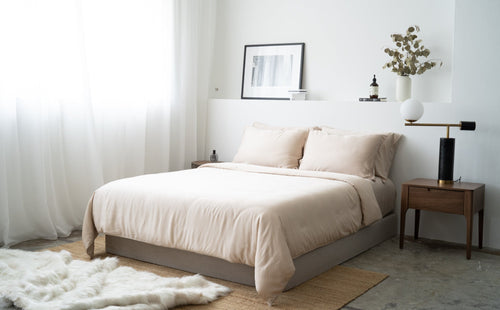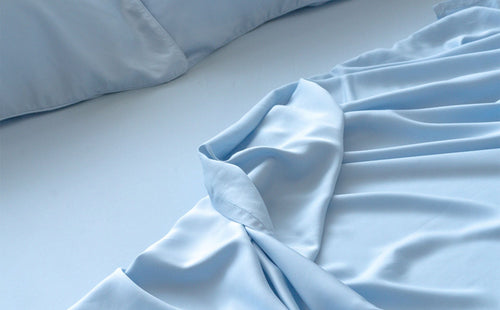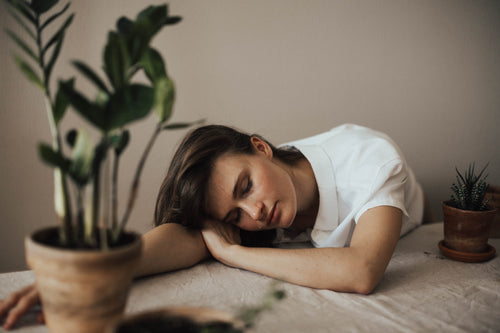At A Glance
Anxiety and night sweats are often closely linked but overlooked. Understanding this connection can help you sleep more peacefully.
Quick Tips
- Set bedroom temperature to a cool 25°C at night
- Use breathable, moisture-wicking bedding like TENCEL™ fabric
- Try journalling or light yoga to ease nighttime anxiety
Night sweats can be confusing, especially when people immediately worry that something serious is wrong with their health. While it’s true that night sweats can sometimes be a symptom of medical conditions, many overlook the emotional triggers. Anxiety and night sweats often go hand in hand, particularly at night, when stress and worry can cause sweating.
Your mental health may be affecting your physical health more than you think if you often wake up sweating and anxious or have trouble falling asleep because your mind is racing.
This article talks about the connection between anxiety and night sweats, gives science-based tips on how to deal with the problem, and tells you when to see a doctor. Let’s dive in!
The Link Between Anxiety & Night Sweats
Anxiety doesn’t always switch off at bedtime. Research shows that up to 41% of people experience night sweats, even without any underlying medical conditions.
For many people, it lingers through the night, showing up as racing thoughts, a fast heartbeat, and unexpected sweating. These are all part of the connection between anxiety and night sweats, and they’re especially common during or after panic attacks.
When your nervous system stays on high alert, even while you sleep, your body can respond by overheating, and that often leads to sweating.

Image From Freepik
It’s not just about feeling hot. Anxiety at night can cause all sorts of sleep disturbances — waking up suddenly, struggling to drift off again, or feeling restless for hours. Over time, these interruptions add up, and you start noticing poor sleep quality symptoms like low energy, irritability, and difficulty concentrating during the day.
So, can emotional stress cause night sweats? Deep down, you already know the answer. It absolutely can, and it’s a clear sign that your body and mind are more closely linked than you might think.
How To Keep Night Sweats From Anxiety Under Control
The good news is we have ways to help you stop the stress of night sweats. From improving your sleep environment to calming nighttime routines, small changes can make a real difference.
1. Journal Or Write Down Worries Before Bedtime
Expressive writing is one of the best ways to calm a racing mind. Writing in a journal for just 10 minutes before bed can reduce symptoms of sleep anxiety by giving the brain time to work through thoughts that are still bothering it.
This method helps you sleep longer by clearing your mind and helping you get hours of sleep, especially when you use it as part of a relaxing bedtime routine.

Image By Rawpixel.com From Freepik
2. Create A Cool And Comfortable Sleep Environment
If you’re dealing with anxiety and sleep disorders, keeping your sleep environment cool can make a real difference. Overheating at night often leads to sweating while sleeping or experiencing night sweats, which only adds to your discomfort.
TENCEL™ bedding, such as bed sheets, duvet covers, and flat sheets, offers a breathable and moisture-wicking alternative. It helps regulate your body temperature naturally, so you’re less likely to wake up in the middle of the night feeling too hot or sticky. TENCEL™ fabric is soft, smooth, and gentle on the skin — ideal for those who want a more calming, comfortable night’s rest.
If you’ve been tossing and turning or waking up drenched, this simple switch could help ease your nights and make your sleep feel more settled.
Featuring Weavve’s Signature TENCEL™ Classic Set
For a more restful environment, here are some tips you can try right away:
- Keep the room cool: Set your bedroom aircon to around 25°C, the recommended temperature in Singapore and many tropical countries to enjoy a comfortable night’s sleep.
- Use a fan or open a window: Improve air circulation to prevent heat from building up while you sleep.
-
Wear breathable sleepwear: Natural fabrics like cotton or bamboo help wick away moisture and reduce overheating.
3. Avoid Triggers Like Caffeine & Alcohol
Caffeine makes the nervous system work harder and raises the body's core temperature, which are two things that can make you restless and sweat at night.
Alcohol, even though it makes you sleepy at first, stops you from getting deep sleep and messes with your body's ability to regulate its temperature. If you struggle with night sweats, depression symptoms, or poor sleep, it's essential to eliminate both substances in the hours before bedtime.
Instead, drink sleep-friendly drinks like chamomile tea or lemon balm, which help you relax and keep you from waking up because of anxiety.

Image By Jcomp From Freepik
4. Incorporate Items That Help Calm The Body At Night
There are many clinical studies that show weighted blankets can calm the nervous system. The light pressure they give is like deep touch stimulation, which lowers cortisol and raises serotonin and melatonin, two hormones that control sleep and mood.
Using a weighted blanket can be especially helpful for people dealing with depression and night sweats or panic attacks during sleep.
Featuring Weavve’s Weighted Blanket
Other sleep-enhancing accessories to consider:
- Blackout eye masks: Block out light to help your brain wind down faster and stay asleep longer.
- Reed diffusers: Scents like lavender or eucalyptus can ease tension and promote a more relaxed state before bed.
- Soy candles: Create a soft, calming glow that signals your body it’s time to unwind.
- Supportive pillows: Keep your neck and spine aligned, reducing discomfort that might wake you in the night.
- Herbal teas: Blends with calming herbs like valerian or passionflower can gently prepare your body for sleep.
5. Try Gentle Nighttime Exercises
Don't work out hard right before bed because it can make your body temperature rise. Choose gentle yoga, stretching, or a 15-minute walk instead.
These low-impact exercises help you relax and get your blood flowing better. They also help metabolise excess cortisol, a stress hormone linked to night sweats, anxiety, and sleep problems. Doing light exercise an hour before bed improves quality sleep by telling your brain that it's time to switch to rest mode.

Image By Prostooleh From Freepik
How To Know If You Should Talk To A Doctor
Night sweats can be linked to anxiety, but it’s worth seeing a doctor if they:
- Happen often or feel unusually intense
- Come with other symptoms like fatigue, weight loss, or fever
- Disrupt your sleep regularly despite lifestyle changes
In these cases, a quick check-up can help rule out any underlying health issues and give you peace of mind.
Frequently Asked Questions
Why Do I Wake Up Soaking Wet From Sweat?
Waking up soaked in sweat often means your body’s overheating while you sleep. This can happen if your room's too warm, your bedding isn't breathable, or you're feeling stressed or anxious. Fortunately, making a few simple adjustments, such as keeping your room cool, opting for moisture-wicking bedsheets, or taking time to unwind before bed can really help.
How Do You Know If Your Night Sweats Are From Anxiety?
If you have night sweats and also have racing thoughts, shallow breathing, or trouble sleeping without any signs of fever or illness, anxiety is probably the cause. Having worry, stress, and anxiety symptoms during the day makes the link stronger.
What Is The Cause Of Night Sweats In Males?
Night sweats in men can happen for several reasons, from normal body changes to health problems. While they're often nothing to worry about, regular night sweats could be a sign of something more serious. Common causes include low testosterone, sleep apnea, stress, certain medications, and infections.
Should I Change My Sheets After Night Sweats?
Yes, it’s a good idea to change your sheets after experiencing sweating at night while sleeping. Changing them helps maintain hygiene and ensures a fresher, more comfortable sleep environment. If night sweats are frequent, consider using moisture-wicking TENCEL™ bedding to keep things drier throughout the night.
How Do I Protect My Bed From Night Sweats?
To protect your bed from night sweats, using a mattress protector is a great solution. Choosing a high-quality mattress protector creates a barrier between you and the mattress, keeping sweat from soaking into the bed. Look for one with moisture-wicking properties to help keep your mattress dry and fresh.
Key Takeaway
Night sweats and anxiety are a real problem that comes from the complicated relationship between the mind and body. If not managed, it can cause long-term health problems, poor sleep, and more stress.
Fortunately, making changes to your life, like using TENCEL™ bedding to cool down your bedroom, getting rid of stimulants, keeping a journal, and using weighted blankets can help break the cycle.
If these self-care tips don’t bring relief, it’s a good idea to see a doctor to uncover any underlying issues. Understanding what triggers your anxiety and transforming your bedroom into a restful sanctuary can help restore both your sleep and your peace of mind.







































